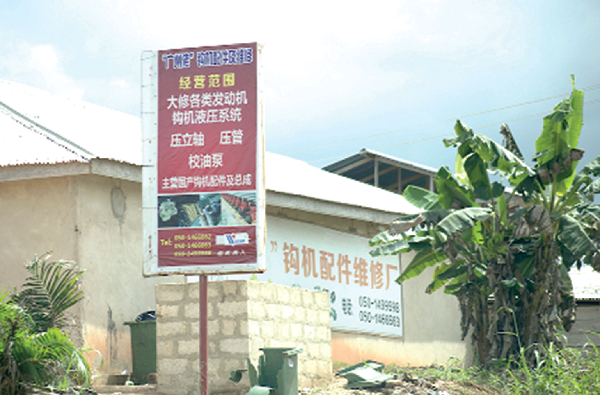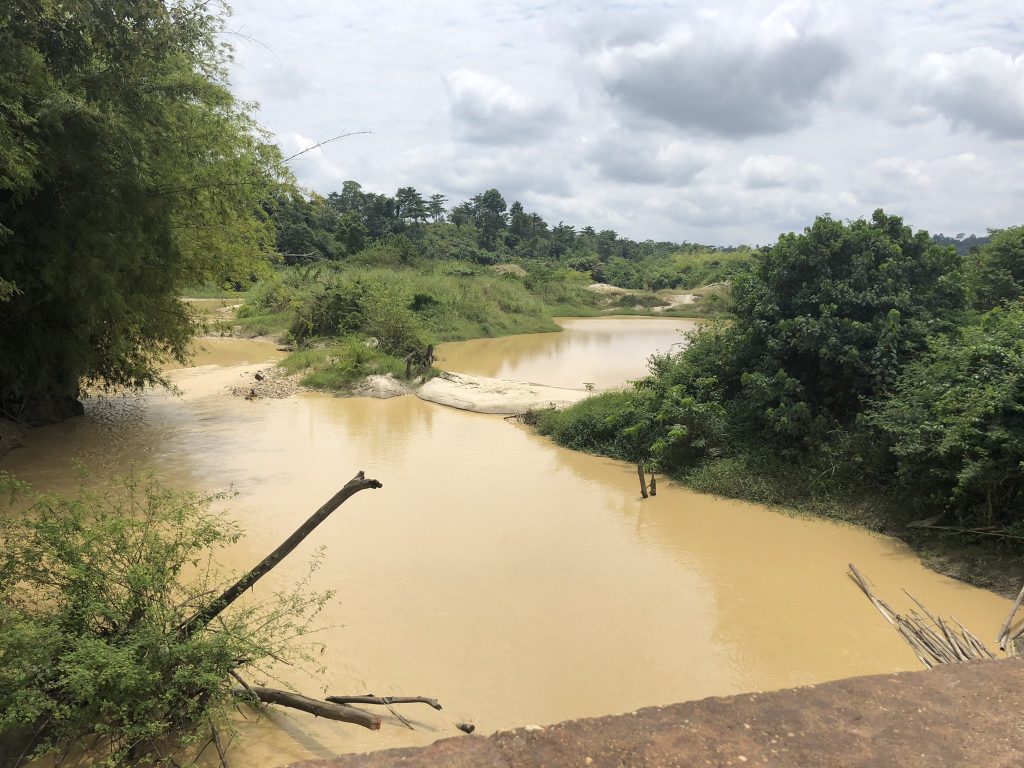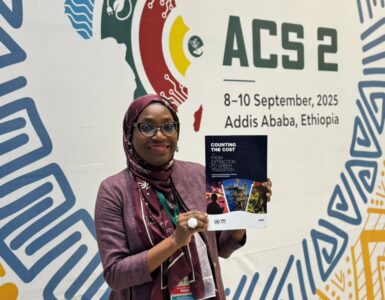At the heart of Ghana’s gold rush is Wassa Akropong – a farming community in the Western North region of Ghana dominated by Chinese nationals who are milking the country’s most precious natural resource.
The Gold Rush
Ghana is a major gold exporter and the precious metal remains one of the vital sources of revenue for the nation. In 2020, gold contributed close to GHC 7.8 billion, roughly 1.3 billion U.S. dollars to Ghana’s Gross Domestic Product (GDP). However, an estimated $2.3 billion worth of illegally-mined gold left Ghana in 2016. In recent years, Ghana witnessed a surge in illegal mining activities popularly called “galamsey”. The galamsey menace has taken a different twist with the involvement of foreign nationals predominantly Chinese.

Wassa Akropong nicknamed China Town lies 314 km from Ghana’s capital city- Accra in the Wassa Amenfi East Municipality of the Western Region. It is a hotspot for illegal mining. Since the gold rush began, the once-quiet community has become robust and bustling with business activities. A visit to Wassa Akropong reveals a spectacle of Chinese citizens settled and working on different mining sites in the community. You are greeted with the sounds of heavy mining equipment and excavators seen in action.
The illegal miners operate on the mining concessions in a similar fashion run by drug cartels with their private security armed with sophisticated weapons and communication gadgets. The Chinese miners established bars, restaurants, and hotels with Chinese inscriptions embossed on them to affirm their comfort.

The Chinese miners use the local residents as a decoy to gain access to the community. They legitimize their activities by hiring some prominent residents to serve as mediators to diffuse any resistance and fuel anonymity. The locals also provide intel and tip-off to the Chinese to vacate the mining area ahead of imminent security operations.
Due to high unemployment and the rising cost of living, community members in Wassa Akropong have no choice but to join forces with Chinese nationals to engage in illegal mining. They are rewarded with pittance while their Chinese counterpart enjoys a more significant share of the revenue.
There is a complex web of culpability between some traditional leaders, politicians, and security agencies who create the enabling environment for Chinese nationals to engage and thrive in large-scale illegal mining.
Social and Economic Cost of Galamsey
It is estimated that Ghana lost about $2.3 billion to illegal mining activities in 2016. These untaxable monies could be useful in developing mining towns and also providing amenities to deprived areas in Ghana. The revenue accrued from illegal mining also fuels crime and other illicit trade. The Chinese miners also acquire weapons and other sophisticated gadgets to enhance their activities.

The environmental damage caused by illegal mining is glaring. The rapid loss of vegetation cover poses a great threat to the climate ambitions of Ghana. Illegal mining heavily impacts deforestation in Ghana as the country lost 60% of its primary forest cover in 2018 – which was the highest in the world.
The failure to reclaim the land after mining poses great risks to community members. The miners do not observe any safety protocol or environmental guidelines. There are reported incidents of death where school kids and community members fell into uncovered mining pits.
Students are not left out in the gold rush. Scores of teenagers abandon the classroom in search of gold money. Some students also support their relatives by selling food, water and other consumables at the galamsey site. The Ghana National Association of Teachers raised a red flag on the spike in student absenteeism and called on the government to address the looming crisis.
The peak in nightlife also fueled prostitution and teenage pregnancy in Wassa Akropong. Chinese nationals and other illegal miners prey on young girls in the community. Hotels and Guest Houses have been invaded by sex workers who recruit other young girls to ply the trade.
Between 2016 and 2020, Ghana recorded 542,131 pregnancies among adolescent girls aged 15-19 years and 13,444 pregnancies amongst young teenagers aged 10-14 years according to the Ghana Health Service District Health Information Management Health System (DHIMS). Young girls in mining communities are the most vulnerable to teenage pregnancy.

The cocoa industry has been heavily impacted by the galamsey menace. The Ghana Cocoa Board (COCOBOD) has expressed grave concern over the alarming rate at which cocoa farms are being destroyed by illegal miners. A sentiment reechoed by the National Farmers and Fishermen Association. In 2022, a viral video emerged on social media where a farmer affirmed that his colleagues sold their cocoa farms in exchange for quick dollars. The Chief Executive Officer of COCOBOD, Joseph Boahen Aidoo revealed that more than 19,000 hectares (Ha) of cocoa farms had either been destroyed or affected by galamsey activities. This revelation spells doom for a sector that contributes an estimated $2.5 billion in foreign exchange to Ghana annually with an associated 800,000 jobs.
Ghana Water Company Limited (GWCL) is a utility company, fully owned by the state. The company is responsible for potable water supply to all urban communities in Ghana. GWCL issued a red alert and threatened to shut down its operation due to the contaminated nature of the rivers that serve their operations. According to the Managing Director of GWCL, Dr. Clifford A. Braimah, illegal mining is taking a toll on the finances of his organization. He further revealed that the Ghana Water Company Limited uses twice as many chemicals to purify the water.
“The cost is unbearable. We are resorting to more expensive chemicals to be able to reduce the process lost. The cost of treatment continues to rise.” He said.
Galamsey also presents a public health crisis as babies born in these communities have birth defects and deformities. This has been attributed to the seeping of heavy metals -mercury, lead, cyanide, etc into the soil and water bodies.
Government Intervention
The government of Ghana has exhibited a weak political will in addressing the galamsey menace. In 2015, the government launched a joint operation of police and military to tackle illegal mining activities. The government launched 3 different campaigns – Operation Vanguard, Operation Galamstop, and Operation Halt which yielded no significant result in preventing galamsey. The operation was largely inconsistent and unsuccessful.

Some members of the governing New Patriotic Party lamented that government actions against illegal mining would affect the electoral fortunes of the party. It was evident in the 2020 general election where the ruling government lost in major mining communities- political analysts attributed it to the joint operation conducted against illegal mining.
Data from the Ghana Immigration Service reveals that a total of 1641 Chinese nationals engaged in illegal mining were repatriated from Ghana between 2009 and 2022. The repatriation of Chinese miners created diplomatic tensions between Ghana and China. The Chinese Embassy in Ghana expressed worry over what they call a targeted media campaign against Chinese citizens in Ghana. Analysts believe the government’s fight against galamsey will impact its ability to receive loans or any financial support from China. The combined effect of electorates apathy in mining communities and the reaction of the Chinese government led to a cautionary approach by the government of Ghana in their quest to address galamsey.

A country on the brink
The unregulated and reckless activities of illegal miners pose great environmental risks to Ghana. Every facet of the Ghanaian economy will plummet if illegal mining remains unchecked.
Whiles Chinese and other foreign nationals profit heavily from illegal mining, the communities will continue to be in a pitiful state. Bad roads, lack of potable water, deplorable schools, etc will remain a common theme in Wassa Akropong and other mining communities.
The government must show strong political will and an iota of ruthlessness if they want to win the battle against galamsey. The government must also engage all relevant stakeholders – the private sector, civil society organizations, traditional authorities, religious leaders, and political parties. The failure to actively engage all parties will amount to an elusive battle against the menace.






